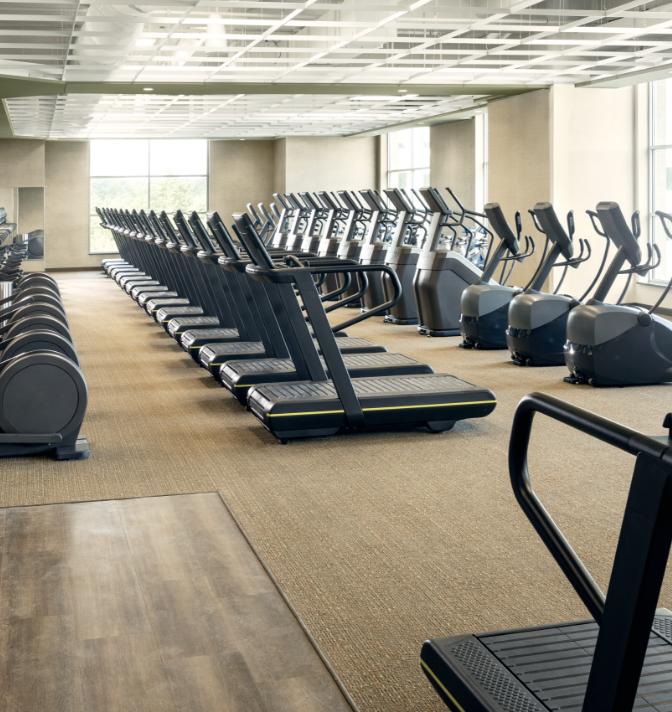Reconfiguring your schedule to work out in the morning might not be easy, but crossing an a.m. workout off your to-do list boasts several benefits.
“Anecdotally, clients who work out first thing in the morning seem to be the most consistent exercisers, since life and schedules are less likely to throw their fitness routine off-kilter,” says Samantha McKinney, RD, CPT, national program manager for nutrition and metabolism at Life Time.
Morning exercise may also help fine-tune your circadian rhythms. These natural processes follow a 24-hour pattern — the most notable of which is the sleep–wake cycle.
“If you think about waking up and starting your day, many things are happening that the brain uses to understand its circadian rhythms,” says W. Chris Winter, MD, a neurologist and sleep specialist based in Charlottesville, Va. These include going from dark to light, inactive to active, and cool to warm.
Exercising in the morning heightens these cues. The movement will warm you up, and bright lights in the gym or sunshine outdoors can send a loud and clear message to your body that the day has begun. “That leads to more consistency to the day’s end, as in falling asleep and sleeping well,” Winter says. (Learn more about circadian rhythms at “The Connection Between Circadian Rhythms and Overall Health.“)
Of course, morning exercise has some drawbacks — and the biggest has to do with potentially losing sleep to get in an early sweat sesh.
It’s a tough sell, but Winter notes that for most people, the sleep shortage is temporary; they will naturally begin retiring earlier the night before. “If I stay up late and get up early to exercise and lose a few hours of sleep, the motivation to stay up late the next day is dramatically tempered,” he explains.
Both Winter and McKinney note that a long-term sleep deficit will not benefit your fitness. Making strength and endurance gains requires exercise as well as recovery — and sleep is a crucial component of the latter.
Exercise can help regulate sleep patterns, but if sleep deprivation is an ongoing issue, it might be wise to refocus your efforts on that aspect of your health. (Discover why sleep is vital to your health and how to prioritize shuteye at “Why Getting Enough Sleep Is Vital to Your Health.”)
6 Tips to Make Morning Workouts Work
1) Make a plan.
Determine when you need to wake up to get your workout done — then allot time to be in bed at least eight hours before that, McKinney says.
2) Start small.
To make your new bedtime less of a shock, make gradual shifts toward it. Try getting to bed and waking up 15 minutes earlier every few days, Winter suggests. Don’t forget to factor in time to wind down: Aim to spend the last hour before bed doing something relaxing without a screen.
3) Ease into movement.
It may take a few days — or weeks — before you’re ready to complete a full-length morning workout. In the meantime, practice doing 10 minutes of movement when you get up “to get yourself used to exertion shortly after waking,” McKinney says. Try a body-weight strength circuit; a yoga, tai chi, or mobility sequence; or a short walk or jog. Bonus points if you can take your practice outdoors and get early exposure to fresh air and sunlight.
4) Prep the night before.
Laying out your workout clothes and preparing your food in the evening can help streamline your morning transition from bed to gym. This way, you don’t have to hunt for stuff once your alarm goes off. Removing barriers to early workouts can help you stay consistent.
5) Heed your body’s signals.
Pay attention to how your new workout schedule feels and how well you perform, as well as your energy levels, mood, hunger, and sleep patterns. If you have a smartwatch, you can track measurements such as your heart rate variability (HRV) — the change in the time that lapses between heartbeats. (Learn more about HRV at “Expert Answers: What’s an Easier Way to Track My HRV?“)
“All of those measurements might suffer in the short term, but if you follow the measurements over time, they should largely bounce back,” Winter says.
If you don’t see improvements, you may need to tweak the intensity of your workouts or how you’re fueling and hydrating. Make sure you’re making time for a warm-up, and prioritize drinking water and eating a protein-rich snack before your workout. (For preworkout snack ideas, visit “12 Quick Preworkout and Postworkout Snacks.”)
6) Give yourself grace.
As with any transition, practicing patience and compassion with yourself can set you up for success. There’s no right or wrong way to be a morning-workout person, so be open to finding the routine that works best for you.
This article originally appeared as “Skip the Snooze Button” in the March/April 2024 issue of Experience Life.






This Post Has 2 Comments
I love this article! It’s spot on! I’m a morning workout person. I don’t get up super early — usually around 8:30 — but it has definitely kept me consistent in my routine. Also, being prepared the night before helps a lot. Just having my workout wear ready and my gym bag packed has helped me get towards my fitness goal.
As a night owl, I spent a good part of my adult life trying to become a morning person, as this is always perceived as “better.” My many attempts at waking at the crack of dawn and developing a morning workout routine, including many tips presented here, failed miserably and left me feeling discouraged, stressed out, and bad about myself. While I fully appreciate the benefits of morning workouts noted here, I think that self-acceptance and learning to make the most of who you are is more important. My morning routine now begins with reflection and planning my days, which allows me to be consistent with my evening workouts and end my day feeling accomplished. Our culture portrays morning people as more persistent and efficient. There are studies that show night owls actually get more done. I would love to see tips on making the best of who you are without trying to fit into a mold that doesn’t fit.